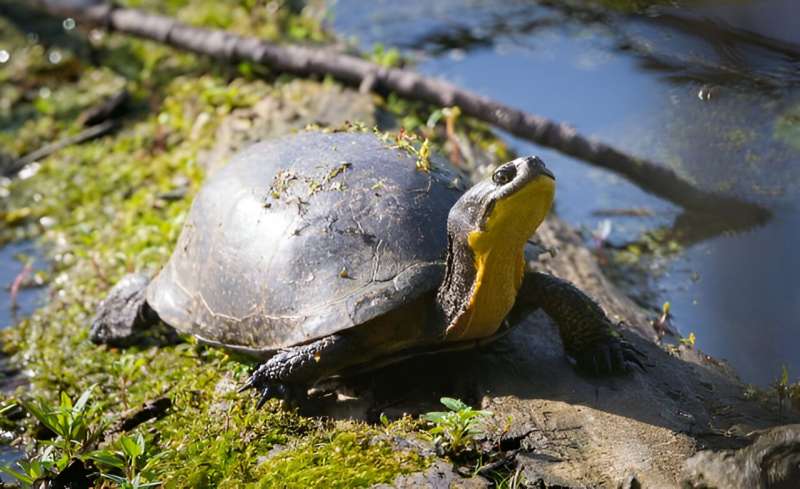This article has been reviewed according to Science X's editorial process and policies. Editors have highlighted the following attributes while ensuring the content's credibility:
fact-checked
trusted source
proofread
Wildlife mitigating measures no help for Ottawa's freshwater turtles, says study

Urban sprawl and insufficient relief measures have left an Ottawa-area freshwater turtle facing extinction within the decade, says new research from the University of Ottawa and Trent University, which tracked changes to the turtle's habitat over a 10-year period.
Specifically, the development of Terry Fox Drive in the city's west end has led to a dangerous decline in the Blanding's turtle's (Emydoidea blandingii) habitat, leading to a 70% decline in adult population size, despite mitigating measures such as wildlife fencing, new wetlands and wildlife passage placement.
The study, "Demographic evidence that development is not compatible with sustainability in semi-urban freshwater turtles," was published in Animal Conservation.
From Threatened status to nearing extinction
Professor Gabriel Blouin-Demers, alongside lead author Anne-Christine Auge, Ph.D. candidate, and Dennis Murray from Trent University, tracked changes in freshwater turtle habitat over a decade while conducting a population viability analysis to predict future population trends. The analysis revealed that the turtle will reach its quasi-extinction threshold within the next few years.
"There was a lot of opposition to the development along Terry Fox Drive, precisely because of the presence of Blanding's turtles," says Blouin-Demers, a full professor in the Department of Biology of the Faculty of Science. "Now we know that the project will have caused the extinction of the population."
The Blanding's turtle's preferred habitat
Easy to recognize with their yellow throats, Blanding's turtles enjoy beaver ponds, wetlands and shallow lakes, where they hibernate in the mud in the winter and sunbathe in the summer. But their habitats are being destroyed by urbanization, which includes loss of access to water and food sources, rising noise levels, pollution, artificial lighting and increased risk of road mortalities.
"We mustn't delude ourselves into thinking that when it comes to turtle conservation, we can have our cake and eat it too," says Blouin-Demers. "Current mitigating measures are not enough."
The authors show that current urban development is incompatible with the Blanding's turtle's survival and call for robust oversight and conservation efforts to safeguard at-risk species in urbanizing areas.
More information: A.‐C. Auge et al, Demographic evidence that development is not compatible with sustainability in semi‐urban freshwater turtles, Animal Conservation (2023). DOI: 10.1111/acv.12903
Provided by University of Ottawa



















